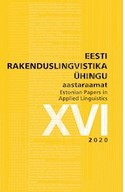SÕNALIIK LEKSIKOGRAAFI TÖÖLAUAL: SÕNALIIKIDE ROLL TÄNAPÄEVA LEKSIKOGRAAFIAS
ON WORD CLASSES IN CONTEMPORARY LEXICOGRAPHY: THE LEXICOGRAPHERS’ VIEW
Author(s): Geda Paulsen, Ene Vainik, Maria TuulikSubject(s): Theoretical Linguistics, Lexis, Computational linguistics, Philology, ICT Information and Communications Technologies
Published by: Eesti Rakenduslingvistika Ühing (ERÜ)
Keywords: word classes; lexicography; semi-structured interview; Estonian;
Summary/Abstract: This study examines the role of word classes in the contemporary lexicographic work. The analysis is based on a metalexicographic semi-structured interview carried out among 23 Estonian lexicographers. We focus on three main research questions: i) How necessary are word classes in lexicopraphers’ work? ii) What kinds of problems they do experience related to the word classes? iii) How do lexicographers solve these problems and how could digital tools facilitate the word class judgement processes? The results indicate that in lexicography, word classes provide an (implicit or explicit) frame for organisation of data, even if word-class tagging does not directly belong among the tasks of the lexicographer. The word class determination process in unclear cases is a complicated one. In addition to the usage of a word and the expected needs of the user, the lexicographer must consider the structural requirements of the particular dictionary (s)he is working with. Along with the development of digital resources, the demands of the data model behind the electronic database have to be considered; not to mention the theoretical linguistic insights. Linguistically, the most problematic issues appear in the grammaticalization and lexicalisation processes related to inflectional suffixes (mainly adverbs and adpositions) or conversional transposition (adjectives). The typical word-class altering devices in Estonian such as suffixal derivation (see, e.g. Vare 2006: 199) do not emerge as particularly problematic. The interviewed lexicographers would welcome a digital application that would facilitate and quickened the word class determination process. The application would have an improved morphological tagger compared to the present tools and it would be more efficient in extracting statistical information from corpora. Lexicographers wish to acquire information about the prevailing word-class function together with the data this assessment is based on. Yet, the lexicographer makes the final decision.
Journal: Eesti Rakenduslingvistika Ühingu aastaraamat
- Issue Year: 2020
- Issue No: 16
- Page Range: 177-202
- Page Count: 26
- Language: Estonian

